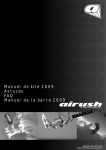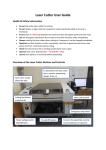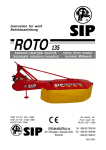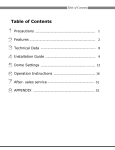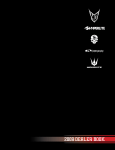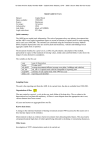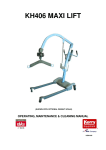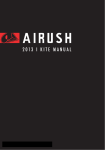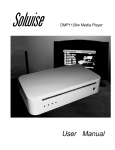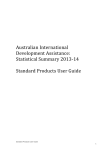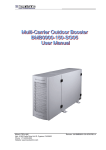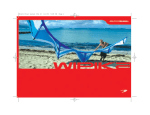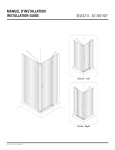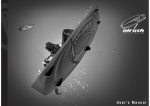Download 09 KITE MANUAL FINAL.cdr - 2009
Transcript
Kite Manual 2009 User’s Tips FAQ Bar Manual 2009 KITE MANUAL 2009 TECHNICAL ADVANTAGE 09 KITE MANUAL Dear Rider We would like to express our gratitude to you for purchasing an Airush kite. We are sure you will have hours of action packed fun each time you fly. Remember safety comes first and please read the following instruction guide before taking off. Have fun! Airush Development Crew Release of Liability and Claim Waiver In consideration of the purchase of this product you hereby agree to the fullest extent permitted by law as follows: To waive any and all claims that you have or may in the future have against AIRUSH, its parent or associated companies, resulting from use of this product and any of its components. To release AIRUSH from any and all responsibility and liability for any loss, damage, expense, accidents and/or injury to people, objects and/or product which may occur as a result of the use of the product, due to any cause whatsoever, including negligence or breach of contract on the part of AIRUSH in the design or manufacture of this product. Possible faults or delays in repairs give the purchaser no right of compensation for damages or warranty extension. Transport costs are at purchasers cost as well as costs resulting from the inspection he/she has applied and accepted by AIRUSH. AIRUSH expressly disclaims any implied warranties of merchantability of fitness for a particular purpose and disclaims any and all responsibility and liability for consequential and incidental damage or any other losses arising from the use of these parts, products and/or components. #02 09 KITE MANUAL Release of Liability, Claim Waiver and Assumption of Risk Agreement By assembling this product, you are agreeing to; 1. be bound to the terms set forth below; and 2. require anyone using this product to be bound by such terms. If you are unwilling to be bound by these terms return this product (before use) for a full refund. ASSUMPTION OF RISK / IMPORTANT WARNING! Use of this product and any of its components involves certain inherent risks, dangers and hazards, which can result in serious personal injury or death. In using this product you freely agree to assume and accept any and all known and unknown risks of injury while using the equipment. The risks inherent in the sport can be greatly reduced by abiding by the Warning and Safety guidelines listed in this User’s Manual and by using common sense. If under the age of 18 years do not kiteboard without the clear consent from a parent or guardian and the correct supervision. If you are learning for the first time, we strongly recommend lessons from a professional instructor connected to an authorized training center. Arbitration The purchaser agrees that the laws of Thailand shall govern any disputes, controversy or claims involving AIRUSH. Such disputes, controversy or claims shall be referred to and finally settled by arbitration in accordance with the Rules of Arbitration of the Thailand International Arbitration Center. The language to be used in arbitrate proceedings shall be English. Arbitration shall be commenced within one (1) year from the date on which any alleged claim first arose. Entire Agreement In entering into this Agreement, you are not relying upon any oral or written representations other than what is set forth in this Agreement and Users Manual. #03 09 KITE MANUAL Contents #04 #05 - #06 #07 - #10 #11 - #12 #13 - #16 #17 - #18 #19 #20 #21 #22 #23 - #26 #27 #28 #29 #30 - #31 #32 - #37 #38 #39 #40 #41 - #53 #54 #55 Safety Kite Bar Control Bar Trigger Release Kite Setup Line Setup NEW Stability Pigtails Powering and De-powering, Packing Stopper Ball fitting instruction Retrofit Swivel Attaching the safety leash to the kite and retrofit Removing and inserting wingtip Battens Removing and repairing a bladder Flying new school Airush kites - Contents Vapor II Flat 5 Performance Vapor II ABS Airush Bar Manual extra info - Contents Warranty Policy Care and Maintenance Warranty Policy 09 KITE MANUAL Safety information and Guide lines: Kiteboarding can be a dangerous sport and should be taken very seriously. It is strongly recommended that you receive expert tuition from a registered instructor prior to use of this product. Power kites, their lines and control system can be dangerous to flyers and to anyone within the vicinity of their use. Do not use your kite near or around power lines, airports, streets, trees, and keep clear of other people and obstacles. Never allow anyone who is not familiar with traction kiting to use this product without experienced assistance. Always learn to use a small-sized, power kite (2m – 3m Trainer foil) before attempting to use this product for the first time. Always use your kite with safety release system and familiarize yourself with the system prior to use. Make sure you spend time to become familiar with the operation of your kite and remember that you are responsible for its safe operation and for the safety of those around you. As you learn the sport make sure to work within your limitations and do not exceed them. Do not for any reason permanently attach yourself to the kite or its safety system. The kite is not intended for use as a flying device nor is it intended as means for a flotation device. A good rule of thumb when kiteboarding is, to always try and ride with a buddy. #05 09 KITE MANUAL Contents Kite bag AIRUSH kite AIRUSH Control Bar, components and flying lines Pump Bladder patch repair kit Sliding stopper STD What to wear: Life jacket Helmet Wetsuit Foot protection - booties Beginning Setup: When setting up your kite and system for the first time we recommend you find some place out of the wind and preferably a nice area so that you can become familiar with the kites system and make sure that it is set up correctly. Choose an area that has enough room to fully layout your kite lines and control bar without any obstructions. If there is any wind at all make sure to position yourself with your back into the win. Choose an area that has enough room to fully layout your kite, lines and control bar without any obstructions. If there is any wind at all make sure to position yourself with your back into the wind. #06 RIGHT RIGHT 09 KITE MANUAL RONSTAN #07 RIGHT RIGHT 09 KITE MANUAL RONSTAN #08 RIGHT RIGHT Centre 09 KITE MANUAL RONSTAN #09 RELEASE LOCK #10 RIGHT RIGHT Centre RIGHT 09 KITE MANUAL 09 KITE MANUAL 01 AIRUSH Control Bar Start by pulling your bar setup from the bag and set everything else aside for later. Your bar has been pre-setup at the factory to try and help decrease the setup time and allow you more time to fly, but you should always check everything and make yourself familiar with the system. 02 03 04 Airush Kitebars feature a leash safety system. One end of the safety leash must attached to either your harness handle ,spinning leash System or a wrist connection. (Picture 1, 2 and 3) The other end of the leash is attached either to the stainless ring on the outside Left end of the bar, or the 5th line (VAPOR II and GENERATOR) When the bar is released, the bar simply slides up the line and lays the kite out flat so it has no power. Airush SLE kites rely on a bar release safety system. When you let go of the bar, it slides further up the lines than on a C-Kite, releasing the majority of the kites power. This gives you time to regain control, grab the bar and re-launch the kite. In a more serious situation, the De-power loop has a quick release trigger which when pulled, releases the bar completely. The safety leash then comes into action as with a normal C-Kite set up. The safety leash that is used to secure you to your kite is also supplied with a safety release if you ever need for some reason to be completely disconnected from your rig. By simply pulling the foam section back, the safety leash will disengage from you. This is only to be used in absolute emergencies, as the result can be loss of your kite. The de-power loop system is supplied with a safety release trigger if you need to be disconnected from your bar. By simply pulling the red quick release Lever you will free yourself from the de-power loop, the kite will de-power completely as the safety leash takes hold. We recommend you practice activating the safety system before you fly the kite and check the functionality of the trigger safety before every session. (Picture 4, 5) 05 To re-set the Quick release safety system you need to reset the trigger pin. #11 09 KITE MANUAL 01 02 03 Layout your lines and separate them parallel to each other starting at the bar. (Picture 01) Notice that the line ends are colored, Grey and Red. The rule to remember is GREY is back. Meaning that the GREY ends should always be connected to the back, or trailing edge connection points on their corresponding sides of the kite. Red is for the front, or leading edge connections, to their corresponding sides. With your lines laid out and separated, connect all the kite ends to a solid object, such as a tree, car bumper or pole, using a piece of strong line. (Picture 02) With the ends attached to a solid safe object and your de-power loop all the way against the bar and sheeting system all the way out (powered up position) (Picture 03, 04) grab your bar and pull back with a good amount of pressure. As you apply and release pressure, all lines should rise and lower evenly and the bar should be perpendicular to the center lines. If this is not correct you will need to do small adjustments to all lines to compensate for this difference. It is important to weight each line individually and then do adjustments. As you pull, each line will begin to lock the fibers into place and minimize a stretch feel in the line. The more time you spend locking down the lines the less work and adjustments you will do later. The goal for all the adjustments is to end up with all lines even at the ends with the de-power loop and sheeting system positioned all the way out (powered up position). 04 The first few times you fly on your bar system, the lines and knots will settle in and slightly change. So always make a point to check your lines after the first new sessions of flying or if your kite feels to pull to one side. Now that you have your bar setup and ready, take your time and wrap your lines back onto the bar. You will learn that taking your time wrapping your lines will result in less line wraps when you lay them out the next time. (Picture 05) 05 #12 06 Once you get to the end of the lines wrap the remainder around the end of the bar, and put the elastic bungee over to hold it all tight (Picture 06) 09 KITE MANUAL AIRUSH Trigger Release Maintenance Manual This manual is written to ensure the function and longevity of the AIRUSH Trigger safety device. If any points are not clear, please contact us via our website www.airush.com Import Notes: The Trigger mechanism should be tested before each kite session. Service this part regularly or after long periods between uses. In any doubts, replace the complete part and do not try to service it by yourself. *Warning: do not use the locking tube unless you are an advanced level rider. Summary 1. Part list 2. Removing the locking tube 3. Replacing the de-power loop 4. Replacing the centerline 5. Servicing the metal parts 6. Replacing the springs 1. Part List The AIRUSH Trigger Release system consists the following parts: 1 Center/de-power line 1 Zytel plastic housing - top part (with round depressions for the screw head) 1 Zytel plastic housing - bottom part (with hexagon depressions for the locknut) 1 Stainless 5mm screw and locknut 2 Stainless 4mm screws and locknuts 1 Red rubber end cap for Trigger lever 1 Metal part A (Trigger lever) 1 Metal part B 1 Metal part C (swing arm) 3 Metal pins (only 2 springs for the advanced trigger) 1 Stainless 4mm screw for spring attachment 1 Spring A (18mm length) 1 Spring B (30mm length) 1 Spring C (30mm length) 1 De-power loop long 1 locking tube DON'T FORGET THE NEW TRIGGER ADVANCED HAS TWO SPRINGS, AND THE STANDARD TRIGGER HAS THREE! #13 09 KITE MANUAL 01 2. Removing the locking tube (for easier unhooked manoeuver) Remove the center 4mm screw. Remove the locking tube. Reinsert the locknut and tighten the screw. (Picture 01, 02,03) 02 03 04 05 #14 3. Replacing the de-power loop Release the Trigger mechanism to get out the steel ring off the swing arm. Loosen the middle 4mm screw till the locknut can be taken out. It is not necessary to remove the screw completely. Take out the outer 4mm screw and locknut. Remove the existing de-power loop. Place the new de-power loop so the hole of the loop is aligned with the plastic housing. Insert the screw till the thread reaches the backside. Insert the locknut and tighten the screw till the gaps in the plastic housing are closed and the screw passes through the total thread of the locknut. (Picture 04, 05) 09 KITE MANUAL 01 02 03 04 4. Replacing the center / de-power line Remove all screws and nuts from the Trigger Release. Open the plastic housing carefully by holding down the metal parts and lifting up the top plastic. (Picture 01, 02) Remove the old centerline, de-power loop and locking tube. Place the 5mm screw in the top plastic housing. Pull the new centerline over the 5mm screw till it is touching the top plastic housing. (Picture 02) Push top and bottom housing together, taking care not to jam / wedge the parts. (Picture 03, 04) Position the 5mm locknut and tighten the screw till all gaps at upper part are closed. Position the de-power loop and locking tube as explained in paragraph 2 and 3. Check the Trigger mechanism is working properly. 5. Servicing the Trigger System and / or replacing the metal parts Remove all screws and nuts. Open up the plastic housing. Remove all metal pins. Remove all metal parts. Clean and remove all sand, salt and dirt with warm water and soap. Do not use aggressive chemical solvent who could affect the different materials. Dry the parts Check all parts for function, condition and shape and replace any defective parts. Remove small burs and scratches on the metal parts and plastic housing by using fine sandpaper. When necessary, service the spring blades as explained in paragraph 6 Slightly lubricate all metal parts with grease, oil or silicone spray. Remove any excessive lubricant. #15 09 KITE MANUAL 01 Insert metal part B a few millimeters into the bottom plastic housing. (Picture 01) Place metal part A (Trigger lever) in the correct position and fix it with a metal pin. Make sure the springs are aligned with the gap. (Picture 02) Place metal part C (swing arm) in the correct position and fix it with a metal pin. (Picture 03) Push metal part B down as much as possible and place in the third remaining pin. Place the 5mm screw in the top plastic housing. Pull the centerline over the 5mm screw until it is touching the top plastic housing. Close the plastic housing as explained in paragraph 4. Check the Trigger mechanism is working properly. 02 DON'T FORGET THE NEW TRIGGER ADVANCED HAS TWO SPRINGS, AND THE STANDARD TRIGGER HAS THREE! 03 04 STANDARD TRIGGER 05 ADVANCED TRIGGER #16 6. Servicing and replacing the metal springs (Picture 04, 05) Under intense use, the springs on the Trigger Release mechanism can be prone to wear, this can cause the mechanism to unintentionally release. An indication is a loose and movable Trigger lever. Open up the Trigger system as explained in paragraph 5. Unscrew the small M4 screw at the springs without removing the red rubber end cap. Remove all springs from the lever, check the condition and shape. Do not try to bend the springs. In any doubts of the performance of the springs, replace the whole set (3springs and screw). Lubricate the springs with an appropriate grease, oil or silicone spray. Combine spring 1,2 and 3 that the hole for the screw is aligned (all 3 springs have an individual shape!) Apply thread locker (i.e. Loctite) on the screw and thread to prevent screws loosening during use. While tightening the screws, make sure that the springs remain aligned. Assemble all parts carefully as explained previously. * WARNING! Due to many external factors and the inherent dangers of Kiteboarding, do not rely on this release system to activate under all conditions. Kite within your limitations and stay far away from dangerous obstacles. 09 KITE MANUAL 01 Kite Setup: Layout your kite with struts facing up. If you are in any wind at all put some sand or weight on one wing tip and let the kite lay out down wind away from the weight. On a SLE kite, pull all the bridle lines apart to form four separate sections ie, front left, front right, back left, back right. (Picture 01) Inflation of the struts is done by using the pump supplied with your kite. If your kite has the SPS system (one pump inflation system), plug the pump to the centre valve on the leading edge. Then lock tube on each strut. If not inflate the struts from one side to the other. When you are doing this for the first time inflate each strut till it begins to take shape applying only a light amount of air pressure. Then squeeze each strut from end to end making sure that the internal bladder fills all the internal space and that there are no voids. Then continue inflating. #17 09 KITE MANUAL 01 DO NOT OVER INFLATE THE STRUTS. Once it is firm to the touch, it is fully inflated. (Should you have a pump gauge this is around 9 PSI) Once you have a strut fully inflated remove the pump and if the pressure is high enough the internal one-way “ball valve” should close off* (if the ball valve doesn’t close, rotate the strut so the valve is pointing down. This should make the ball fall and block the hole) and allow you time to insert the plug. At this time wrap the Velcro over the valve to protect it from inadvertently opening. Due to different heat conditions around the world, the plug may be slightly tight or loose in the valve hole, if its too loose, wrap the plug with plumbing tape. 02 With the struts fully inflated attach the pump leash and begin pumping up the main leading edge strut. If at this time you have weight on a wing tip remove it so that the tips can rise as you pump the main strut. (Picture 02) The main leading edge strut is important to pump up correctly with the right amount of pressure. Over inflate and you can damage the strut. Under inflate and the kite will be difficult to relaunch off the water. Should you have a pump gauge this is 6.5 PSI. more pressure makes your kite performance increase dramatically, to a point though, don't use an airline or compressor as they can go over 10 - 12 psi which may burst your kite. Firmly secure the deflate valve with the Velcro. Securing your kite on the beach: At this point you are ready to attach your fly lines. Turn your kite over, struts facing down, and leading edge facing into the wind and secure with sand or weight bag. Always secure your kite with more weight than you think you need. An unmanned kite can be very dangerous. If you don’t have a sandy beach consider getting an Airush kite weight bag. Never secure your kite with sharp objects, such as rocks or a board with sharp fins. Be aware of other beach users and riders. When you are not launching or ready to ride, keep your lines wrapped on the bar, so that the beach or area is clear of lines that can easily get in the way of someone. Don't leave your kite flapping on the beach all day in the wind and sun, it can damage your kite #18 09 KITE MANUAL 01 Lines to kite connection: Begin by laying out your fly lines down wind from the bar and close to your kite. Lay the lines out so they are no twisted (Picture01) Separate the lines so that your two Red ended center lines are a good distance apart from each other then lay the two Grey ended lines on either side of the red lines that correspond to that side. On a C-Kite bar The fifth line (white) should be in the center of the two red lines SLE kites (with bridles) need to have the bridles separated from each other and not twisted. (Picture 01 page 18) The bridle has four connection points, two red (in the center) and two black (connected to the wingtip part of the bridle) 02 C-Kites - On each wing tip you will notice two connection points, the one that is closest to the ground is the front or leading edge connection point, this is for connecting the RED ended fly lines to. The other one on each tip is the Back or Trailing Edge connecting point, this is for connecting the GREY ended fly lines to. (Remember GREY is back) On the back lines there are three connection points (knots) The recommended setting is the center setting. 03 On the side that corresponds with that side of the kite take the Red and Black ends of the fly lines and pull them to that tip, keeping them apart. Start by attaching the Red, Front line, using a larks-head, slipknot. (Picture 02) Then take the GREY ended line and attach it just behind the second knot. (Picture 03) 04 Once you have finished attaching the lines to one side of the kite, repeat for the other wing tip, making sure to attach to the same positions as you have done on the first wing tip knots. For the Vapor II kite there is Adjustable Bar Pressure and a Adjustable Steering Speed System. Please see below. ABS Adjustable Bar Pressure Adjustable Steering Speed ABS H E A V I E R Increased bar Pressure & Feedback ABS L I G H T E R Reduced bar Pressure Slower Steering Faster Steering #19 09 KITE MANUAL NEW STABILITY Pigtail For 2009, FLOW, DNA and VAPOR II kites are supplied with this new back pigtail, to increase the stability and reduce the backfly tendencies of the kites The positions on the pigtails are shown below : 1st knot : Very fast steering advanced riders in strong wind only 2nd knot : Standard AIRUSH setting for majority of riders 5th knot : Reduced backflying position. (please note steering is reduced slightly with this setting) #20 09 KITE MANUAL 01 04 02 03 Power and de-powering: The two lines that come to the center of the bar that attach to the front or leading edge of the kite or bridle (Red) are for changing the angle of the kite allowing the Rider to increase or decrease the power of the kite. 05 Whist hooked in to the chicken loop, the kite’s power can be increased or decreased by moving the bar towards or away from your body. Pushing the bar away decreases the power of the kite, whereas pulling the bar increases the power. (Picture 01, 02) The kite’s power can also be adjusted using the de-power strap or de-power line. Pulling in on the strap or line (reducing the length) causes the kite’s power to decrease. (Picture 03,05) Pulling on the power up loop or releasing some of the de-power line will increase the length of the strap / line and will make the kite to power up and cause more pull. (Picture 04,06) 06 These adjustments should only be done in small amounts. If you over De-power the kite you can decrease your control inputs to the kite by making your back (control) lines to become to slack. WINDDIRECTION Neutral Zone/Less Power More Power Most Power #21 09 KITE MANUAL 01 02 03 04 Deflating and packing your Kite: 05 1. Place your kite with the Leading edge facing down with the nose into the wind and remove the flying lines from their connection points, on the kite. (Place any long bridles into the rescue handles) 2. Holding the kite by its leading edge flip the kite so that the tips are facing upwards. 3. Open the deflate valve and allow the Leading edge to deflate. (Picture 01) 4. If your kite has the SPS system, unlock the tubes and open the main deflating valve on the leading edge. 5. If not, starting at one of the tips, open each strut valve and insert deflator. This ensures that the valve ball does not re engage. 6. Once all the struts have been deflated, roll the kite from the tips inwards towards the center strut. (Picture 02) Remove the deflators from the valve as they can get damaged when rolling. 7. Fold the kite and insert into bag. (Picture 03,04,05) Packing your Kite without deflating the struts: 06 1. Starting at the tips roll the kite towards the center strut. (Picture 06) 2. Extend the top section of the bag. 3. Extend the bottom of the bag. 4. Insert the kite from the base of the bag with the Leading Edge towards the base if the bag. (Picture 07) Note : If your kite has the SPS system, leave the tubes locked and open the main deflating valve on the leading edge. 07 07 #22 09 KITE MANUAL Partial lock Stopper Ball Full lock Stopper Ball RELEASE LOCK RELEASE LOCK This can be used to rest the bar against, and to stop the bar from sliding all the way up to the swivel. If de-power is needed, the stopper can be pushed up the de-power line by forcing the bar against it. The Full Lock mode is for advanced riders only, it TOTALLY stops the bar from sliding up the depower line, even if the rider pushes the bar against it. When the bar is not pushing against the stopper, it can be moved up the de-power line by pulling the top section, and moved down by pulling the bottom section. #23 09 KITE MANUAL Remove the sliding stopper ball from a cleat bar 01 The stopper ball is great for resting the bar against and for spinning the bar, but slightly reduces the kites de-power safety. Please make sure you read this before you go kiteboarding If you are a beginner, we recommend you remove this stopper before you ride. 1. Untie the de-power handle and un-thread the line from the cleat, (Picture 01) 02 2. Then un-thread the line from the hole in the bar, from the stopper ball and from the pulley (Picture 02) 3. Then thread the line back through the pulley (Picture 03) 4. Thread the line back through the bar, cleat and de-power handle and re-tie the knot.(Picture 04) 03 04 #24 09 KITE MANUAL Remove the sliding stopper ball from a strap bar 01 The stopper ball is great for resting the bar against and for spinning the bar, but slightly reduces the kites de-power safety. Please make sure you read this before you go kiteboarding If you are a beginner, we recommend you remove this stopper before you ride. 1. Untie the knots between the de-power ropes and the strap (Picture 01) 02 2. Then un-thread the line from the strap, from the de-power handle guide and from the stopper ball(Picture 02) 3. Then thread the line back through the de-power handle guide (Picture 03) 4. Thread the line back through strap and re-tie the knot.(Picture 04) 03 04 #25 09 KITE MANUAL 01 Full stopper fitting Supplied with the bar, the Full Stopper Ball is used by advanced riders only. It is fitted onto the de-power line, above the bar and gives the rider the ability to “rest” the bar in any position along the de-power line. The stopper can be moved easily along the line but is firm when the bar reaches it. 02 Attaching onto the freeride bar: 1. Untie the de-power handle and un-thread the line from the cleat, (Picture 01,02,03) Then un-thread the line from the hole in the bar and from the pulley. 2. Then thread one side of the stopper ball. 3. Thread the line through the pulley and back through other side of the stopper ball.(Picture 05) 4. Thread the line back through the bar, cleat and de-power handle (Picture 06,07) and re-tie the knot. 5. Put the cover on the top section of the stopper ball. Tie the cabletie.(Picture 08) 03 06 04 07 05 08 #26 09 KITE MANUAL 01 Retrofit Swivel (On 4 Line set up Only) The Retrofit swivel is designed to be used in conjunction with most standard spreader bars. This component allows the rider to spin the bar without having the leash tangling. *Note: In certain instances the retrofit swivel may not be compatible with your spreader bar. In this instance please revert to the wrist leash for safety. 02 Fitting the Retrofit Swivel Installation 1. Unscrew bolts from back swivel unit. (Picture 01) 2. Place plastic component of unit over hook of spreader bar as indicated. (Picture 02) 3. Fit U plate to back of spreader bar holding nuts in place with other hand. (Picture 03) 4. Reinsert bolts and tighten, take care to align Swivel to allow room for the harness line to hook in and out. (Picture04) 03 *Note: Additional EVA should be added if the clamp is not tight enough on the spreader bar. 04 #27 09 KITE MANUAL 01 Attaching the safety leash to the kite and retrofit Swivel 1. Attach leash needle release to stainless ring as indicated. (Picture 01,02,03) 2. Clip karabiner into harness until bar and kite is setup and ready to fly. (Picture 04) 3. Clip karabiner onto re-ride ring BEFORE launching the kite. (Picture 05) 02 03 #28 04 05 09 KITE MANUAL 01 Removing and inserting wingtip Battens To remove 1. Slide flat object (such as a flat screwdriver) between Velcro as indicated. This will loosen the Velcro. (Picture01) 2. Pull on the rope loop to slide batten end cover out. (Picture 02) 3. Slide batten out. (Picture03) 02 To insert wingtip batten 1. Insert Batten into batten pocket (Picture 03) 2. Place tip of flat object (such as a flat screwdriver) into pocket on end of batten end cover. (Picture 04) 3. Slide Batten end cover between inside of batten pocket and batten. (Picture 05) 4. Apply tension and then remove screwdriver. Velcro will connect. *Note: It is not recommended to remove wingtip battens after each use as the Velcro has a limited life span. Battens can be removed when travelling. 03 04 05 #29 09 KITE MANUAL 01 Bladder Repair: For any major cuts or rips make sure to consult your local Airush dealer or kite repair center for assistance. Before attempting any bladder repairs make sure your kite is clean and dry. Avoid repairing your kite on the beach, on dirty or windy areas. A grassy clean place out of the wind area is preferred. 02 Make sure to deflate all bladders when doing repairs. You will need one of your fly lines, or an extra piece of line before you start removing a bladder from the kite. Lay the kite out flat, struts facing up. Detach the Velcro closure at the base of the damaged strut. This will open up the strut casing and allow you to access the bladder. (Picture 01 page 28)Next tie on an end of the extra line to the air valve of the strut being removed. (Picture 02) 03 Gently push the valve down through its hole in the strut casing. Go to the end of the strut and slowly pull the bladder out as the line you tied to the valve feeds into the valve hole. Having the line through the strut sleeve will allow you to easily replace the bladder once it is repaired. Inflate the bladder using your pump. 04 Most of the time you will usually hear the leak. But you can also submerge the tube in water to locate the hole. Once you have located the leak, dry the area and mark with a permanent marker. (Picture 03) Select a patch from the self adhesive pack. Next lightly sand the area where the leak is. Remove the paper backing from the patch and apply to the leak apply pressure to ensure good adhesion. Again inflate the bladder and check that the leak has been taken care of. (Picture 04) Deflate once again and tie the line back onto the valve. Slowly pull the bladder back into the casing from the end. Making sure the bladder aligns itself inside the casing. Once the bladder is replaced gently work the valve and Velcro back into its hole. Make sure to close the Velcro at the end and then slowly inflate the bladder. As the strut begins to take shape make sure the bladder fills the inside casing and that there are no voids. #30 09 KITE MANUAL 01 Main Strut Repair: Repairing the main leading edge strut is done exactly the same way, except you will have to feed a line from each direction from the tips. (Picture 01) Pulling the bladder through the zippered opening located on the inside of the main strut off to the side of the valve. (Picture 02) 02 It is very important to fold the bladder flat off to one side of the opening when reinserting it so that you do not get any twists while it is fed into the slot. (Picture 03) It is also very helpful to apply a baby powder to the bladder before reinserting. It will allow it to easily align itself when pumping it back up. Kite Canopy Repair: 03 Any major tears or repairs to the sail area, we recommend you consult your local Airush Dealer or Airush kite repair loft for assistance. Minor tears can be taken care of with the supplied sail repair tape. Make sure to thoroughly clean and dry the surface being repaired. Lay the kite out flat on a smooth table or surface. Cut two matching pieces of material, one for each side of the sail that covers the tear at least one inch all the way around. Carefully place one piece onto one side, making sure that the tear lays together along the rip. Then cover the other side matching the piece placed on the first side. #31 09 KITE MANUAL FLYING NEW SCHOOL AIRUSH KITES Contents #33 - #34 #35 - #17 #38 #39 #32 Intro Frequently asked questions Vapor II Flat 5 Performance Vapor II ABS 09 KITE MANUAL FLYING AIRUSH KITES: intro With this guide, we just want to go over the basics of what the kite Is designed to do and how it is supposed to be used. There are a Few myths and a lot of hype about kites that have been release over the last few years This guide hopefully will answer a few of the frequently asked questions that riders may have Ever since the first bow kite was released, the idea of a kite with huge De-power and easy roll over re-launch has been getting more and more popular. Most types of kite terms are explained as best as possible below: BOW = Any kite that is swept on the leading edge, and concave on the trailing edge, it can also include having pulleys on the ends of the bar. RONSTAN RONSTAN RONSTAN SLE = “Supported Leading Edge” which means the center of the kite is supported along the LE by a bridle or a 5th line. BOW / SLE KITE BOW BAR Hybrid = Somewhere in between a C- kite and a BOW, SLE. BOW KITE HYBRID KITE C-SHAPE KITE C-Kite or “C-shape” kite = This refers to a kite which is only supported by 4 lines at the far ends of the canopy. #33 09 KITE MANUAL FLYING AIRUSH KITES: intro Other terms sometimes used: Flat = Any kite that is flatter than a C Kite, usually this means it is supported along the LE by a bridle or a 5th line. C-SHAPE KITE Swept = Any kite that more swept than a C Kite, usually this means it is supported along the LE by a bridle or a 5th line. BOW KITE In this guide we will simply refer to the kites as: C-Kites = four line with no bridle and no support along the leading edge (5th line) SLE - Kites = any kite that is supported along the LE by a 5th line or bridles SLE’s and C’s: SLE kites main benefits compared to C-kites are de-power, re-launch and wind range. De-power is great as you can adust the kites angle of attack so it has less or more power, while leaving it in the same place in the window. Its also safe as when the bar is released, the kite has much less power than a C-kite causing much less danger and injuries. Re-launch has been improved by making “roll over re-launch” possible, which means you can simply pull one steering line and the kite can re-launch, even when the kite is straight downwind from the rider. As apposed to C-kites which have to be laid on their back and moved across the wind window until they can launch. Wind range just means, because of the de-power and being able to adjust the angle of attack, the kite can be used in much more wind. #34 09 KITE MANUAL FLYING AIRUSH KITES: Frequently asked questions BACKFLYING Due to the swept set up of a SLE kite, they can tend to back fly and stall a little easier than CKites. This is simply because the kite has not enough wind or a too high angle of attack, so the kite actually goes in reverse. To fix this problem, the kite needs to be “sheeted out” or the angle of attack reduced, then the kite regains forward motion. Kites tend to backfly more in light wind with big kites that are set-up to fly really fast. Big kites have much more weight, so when they have momentum from the downward swoop, then turned to rise up again, the kite is prone to stall or backfly. As it turns, it slows down, so there is less airflow over the kite also. Remember to push your bar when you see your kite backflying. CORRECTING BACKFLYING You can reduce the chances of your kite from backflying, by increasing the length of the back lines (with a small piece of line or pigtail) or shortening the front lines. This reduces the angle of attack, similar to slightly sheeting the kite out. #Please note: increasing the length of your backlines or reducing your frontlines will slightly reduced you kites ability to steer. Probably the best way to stop backflying, is for the rider to experiment themselves. Fly the kite in light winds and TRY to make the kite backstall, this then gives the rider a feel for when its about to happen and they can adjust the kite accordingly. Either by reducing the angle and agressivness of the swoop so the kite is not forced to stall, or by pushing the bar away (reducing the angle of attack) HIGH ANGLE OF ATTACK Increase back line tension LOW ANGLE OF ATTACK Reduce back line tension BRIDLE OVERLOAD Having the Leading edge supported works well, but in insane conditions and very high winds, the support is eventually going to fail. This does not mean the lines snap, what happens is the pressure in the kite starts to become un-even (pulls more on one section than another). Then the support will become inconsistent and the kite will fold, distort or just generally loose its shape which will affect the way the kite flies. This is normally an indication the kite is outside of its recommend range our under inflated. 5TH LINE TENSION We have had a lot of variance in opinion on how much tension the 5th line should have on each kite. More so on the Vapor and Vapor II than the generator, but its very much a personal preference issue with the 5th line, some riders like to have it loose so the 5th line does not really effect the kite at all, it just stabilizes the canopy in a gust. Other riders find they like to tighten the 5th line which gives the kite a little more feedback on the bar, but tends to make the kite pivot turn, rather that forward turn. As an intermediate to advanced kite, the Vapor II comes straight out the factory as a fast kite, where we try to aim a bit more at forward steering than pivotal, thats why the 5th line is set up relatively loose when the kite is brand new. #35 09 KITE MANUAL FLYING AIRUSH KITES: Frequently asked questions ROLL-OVER-RE-LAUNCH Because of a really curved Leading edge shape and swept wingtips, a SLE kite can usually be relaunched from the water much easier than a C-kite. When the kite lands face down (Leading edge down) on the water directly downwind of the rider, it can be made to “roll-over” on itself and take off almost immediately. #Please note this is as long as there is sufficient wind to allow this. There are a few variances to how this can be achieved. LIGHT WIND RE-LAUNCH In super light wind or with larger kites, it may become difficult for the kite to roll-over or take off. In this situation the rider can slightly swim toward the kite, or even pull the opposite front line on the kite to help it roll-over. Usually the rider will also need to wait for the kite to move itself around toward the edge of the wind window before it will take off. SELF LAUNCH - sliding the LE along the beach Also from the really curved Leading edge shape and swept wingtips, a SLE kite can usually be selflaunched quite easily. This can be very convenient for the rider, but can lead to massive wear along the Leading edge as sometimes it slides fast along the beach, into the direct downwind position before it rolls over and launches. It is impossible to make the kite strong enough to endure this launching technique, if a “car tire” like material was fitted along the LE, the kite would be so heavy that it would hardly fly. Also beaches can have very sharp shells, rocks, or even glass which can cut the kite. DE-POWER As the tow-point (basically the point at the end of the kiteline) is relatively further forward on SLE kites compared to C-Kites, its possible for the kite to have a much bigger de-power range, and angle of attack adjustment range. This is great for safety, but sometimes can get riders into trouble, using either too bigger kite for the conditions, or thinking that one kite will be adequate for any situation. Basically, SLE kites do have a great deal of de-power, but eventually if too much de-power is applied, the back lines become so loose that it becomes very difficult to steer the kite. Also, the angle of attack becomes so low that the kite does not fly properly, the canopy can distort and loose tension, causing it to flap. BAR THROW (amount the bar can move away from the rider) Using the large de-power of new kites, it may be necessary to have a long bar throw. This is to allow the kite to reduce its angle of attack enough for the kite to loose all its power. However when the bar is released, the bar throw may be so long that the bar may be out of reach of the rider. In this situation, pulling on the de-power line to retrieve the bar, the same way someone would ab-sail up a cliff. STOPPER BALLS Stopper balls are designed to stop the bar from moving far up the de-power line (as mentioned above), to rest the bar against, and to make it possible for the rider to release the bar and untwist their lines. This works well but can reduce the safety of the kite. Also some kites are becoming so light on the bar that they can be ridden without a stopper, and the rider does not have tired arms, even after all day. #36 09 KITE MANUAL FLYING AIRUSH KITES: Frequently asked questions CLEATS AND STRAPS With the long bar throw and de-power range of SLE kites, it became difficult to make a de-power strap that was easy to reach, still had the bar throw, and still had the range of adjustments that's needed with new school kites. Cleats below the bar are fairly popular because its very easy to have a long bar throw. The problem with the cleat is there must be some tension in the kite lines for the cleat to work properly. Also some people find that the cleat is hard to pull, they become unhooked when they adjust the de-power or they find the cleat slips. All of these problems are due to there not being enough pressure on the rope to pull it back into the “teeth” of the cleat, once a rider has used a cleat for a few sessions they become used to it and it works fine. Straps above the bar are becoming more popular again also, but they generally reduce the length of the bar throw / de-power length, which reduces the safety of the kite. Put simply, if you can release you bar so it slides a long way up the line and your kite has no power, a de-power strap fitted that far up the lines will be almost impossible to reach. PIVOTAL vs FORWARD STEERING. All kites have a different way of steering due many factors including size, and the amount that the kite twists in order to steer. It’s much easier to check the way the kite steers from watching when the kite goes from swooping down, to the upward direction. Riders have a very personal preference with which turning characteristics they like, some freestyle riders like pivotal kites, and others like forward steering. It's the same in all other disciplines of kiteboarding, there is no right or wrong way to ride, or which style to prefer. Pivotal steering is a really accurate way to steer the kite, the kite will tend to stay in the place that the rider wants it to be, and the direction and movement can be calculated very easily. With pivotal turning the kite tends to slow down a little when it turns, sometime it can almost slow to a stationary position where it “rotates on the spot” and then increases speed again as soon as it stops turning (as soon as the bar is made straight again). Its easy to think of an army tank steering by pulling the break on the inside set of tracks, making the tank turn. Forward turning is where the kite does not slow down as much to turn, but twists itself so the outside wingtip reduces its angle of attack, and the inside wingtip increases its AOA. Forward turning kites generally do not have quite as much of an instant feeling of steering as a pivotal kites, but as the kite turns, it keeps more speed and generates more of a constant pull through the turn. BRIDLES AND 5th LINE TANGLES Unfortunately the downside of having supports on the leading edge it if the kite gets turned inside out, or rolled completely inside itself, the lines can become tangled around the canopy of the kite. Sometimes this is referred to as the “bow tie” situation. Some Airush kites offer a release for the 5th line simply to get the rider out of the issue. #37 09 KITE MANUAL VAPOR II FLAT 5 PERFORMANCE Kite Trim Overview Low wind Stability Configuration Please note the optional low wind stability configuration for the Vapor II. This is ideal for riders looking for a more pivotal flying characteristic and increased stability with reduced chance of back stalling in low winds. STABILITY SETTING Increase length of front lines as indicated below Reduce length of 5th line as indicated below MORE TENSION I N LESS TENSO MORE TENSION RED = STANDARD SETTING GREEN = STABILITY SETTING Stability System measurements Size Front line extension loop Shorten 5th line amount RONSTAN 16m 14m 12m 10m 8.5m 7m 5m 135mm 95mm 95mm 75mm 75mm 60mm 60mm 300mm 270mm 260mm 250mm 200mm 160mm 130mm Please note all kites are set up will all flying lines the same length. #38 09 KITE MANUAL VAPOR II - ABS Adjustable bar pressure system For 2009 we introduced an Adjustable Bar-pressure System, to let the rider customize the amount of bar pressure they have Brand new we offer the “medium” setting which is quite similar to the Vapor I To maintain the kites flying characteristics, the front lines must be the same length relative to the kite on each setting. Three “pigtail” sections are fitted to allow for this, they are referred to as, SECTIONS A, B and C. To use the system, check the guide below. Please note: The “light” bar pressure setting my slightly reduce the bar feedback. Light B C B The HEAVY setting, must use all line sections, ( A , B and C) A Light Heavy A Standard B C Light C Standard Standard Heavy The LIGHT setting, uses line sections A and B. Heavy New - the kite is fitted in the STANDARD setting, using line sections A and B. A #39 09 KITE MANUAL 09 AIRUSH BAR MANUAL extra info Contents #41 #42 #43 #44 #45 #46 - #47 #48 #49 #50 #51 #52 #53 #40 De-power lengths and bar throw Using each bar with each kite How to use the cleat De-power strap instead of cleat De-power distance Airush Strap fitting VAPOR II Constant Canopy Support VAPOR II Release the 5th line Where to attach your leash 09 Airush 4 line bar specification 09 Airush 5 line bar specification 09 Airush 5 line Generator bar specification 09 KITE MANUAL De-power lengths and bar throw. Airush uses a very long bar throw which allows the kite to fully de-power when the bar is released their brands of kites don't allow the bar to move far enough along the de-power line, causing the kite to keep pulling with lots of power, even though the “bar release safety” has been activated (ie, the bar has been released) With Airush bars, in the event of the bar being released accidentally the rider can simply pull back the bar, by holding the de-power line farther up the rope and pull it back within reach. Alternatively, if the rider does not want the safety option, they can either a: use the partial lock stopper (See page 40) b: reduce the length of the back lines and de-power line to make it so the bar only moves a certain “reachable” distance from the rider. (Se page 45) (Please note this reduces the safety of the kite) RONSTAN Other brands 40 cm Standard “SAFE” depower distance AIRUSH BAR STANDARD MARKET BAR #41 09 KITE MANUAL Using each bar with each kite: The airush bar is adaptable to fit almost any kite: The Cleat bar is the most popular option, and works with 100% of the airush range of kites it comes in both the 4 line and 5 line configuration. 4 - line bar = DNA, FLOW. 5 - line bar = VAPOR II and GENERATOR. Also available is the strap bar. Some riders much prefer to use a de-power strap rather than a cleat. The idea behind the strap bar is to have a similar de-power range (or bar throw) for safety, but have extension handles that allow the strap to be reached and adjusted easily. The strap bar is available in both 4 and 5 line options and can be used with the same kites as listed above. (See page 49-50) #42 09 KITE MANUAL Brand new, we make your kite bar to have maximum safety. This means the rider is almost 100% safe when hooked into the chicken loop at all times. Simply by releasing the bar when the rider gets out of control, the bar slides up the de-power line until the kite has almost no power. Then the rider can just pull the de-power line toward themselves and retrieve the bar, hold the bar close to the body and the kite will “power up” again. How to use the Cleat Using the cleat can be tricky at first, but once you get used to it, the cleat is very simple. 1. Make sure you are hooked into the chicken loop. 2. The cleat works under tension, so the rope is pulled deep into the “teeth” of the cleat. Try to only adjust it when you are riding along on the board, if you have to adjust it on the beach, manually pull the rope back against the cleat to make it jam (see pic 4). 3. Make sure you “seat” the rope into the cleat fully so it cant come out (see pic 2). 4. The “left over” section of de-power line needs to be held down towards your feet when you release (see pic 1). 5. The cleat works better when the rope is wet. 6. DO NOT at an angle that lets the rope slide through the cleat, this damages the “teeth” on the cleat so it wont hold the rope properly in the future (pic 3. If this does happen, you will may need to replace your cleat. You can buy them from any airush dealer, 01 02 03 04 PULL #43 09 KITE MANUAL DE-POWER STRAP INSTEAD OF CLEAT Some riders prefer to adjust their kites power with a strap instead of a cleat, this can be changed very easily by fitting the airush de-power strap This however slightly reduces the safety of the kite, as the de-power length is shortened. Thats why we supply the cleat as standard . #44 61 cm Standard strap depower distance 75 cm Standard “SAFE” cleat depower distance 61 cm RONSTAN 09 KITE MANUAL Adjusting the de-power distance Brand new, we make your kite bar to have maximum safety. Confident riders may prefer not to have so much distance for the bar to move, as they do not need 100% safety. This makes the bar much easier to reach when released. To do this simply reduce the length of the outside leader lines, and de-power line until you can easily reach the bar when it is released RONSTAN Standard “SAFE” depower distance 50 cm 75 cm RONSTAN ADVANCED depower distance SHORTEN these lines (see page 6 for details) #45 09 KITE MANUAL 01 09 Airush Strap Fitting 1. The part needed = AZCB08DSC - 2009 DE-POWER STRAP 02 2. Fitting the strap onto the cleat bar 03 3. Using pliers, remove the D-SHACKLE from the swivel and pulley 04 05 #46 4. Thread the D-SHACKLE onto the strap 5. Attach the strap to the swivel using pliers (Super glue or loctite) 09 KITE MANUAL 06 6. Untie the knot on the de-power line and unthread the line from the cleat, bar and pulley 07 7. Thread the de-power line through the de-power handle guide and through the base of the strap 08 8. NOTE: Make sure all the lines are the correct length before you cut off the de-power line 09 9. Thread the rope back through the guide, stopper, bar and cleat. Tie a knot and cut the extra line off #47 09 KITE MANUAL 1. The Vapor II Swivel / bullet leash, operates as a 5th line leash, as per previous years (2006, 07, 08) It also has the CONSTANT CANOPY SUPPORT system as previous Vapor, to keep both front lines, and the 5th line the same length when fully de-powered. 02 01 Airush Constant Canopy Support RONSTAN #48 Without Constant Canopy Support Changes in depower trim cause the canopy to have reduced support reducing the kites performance, depower and stability. 09 KITE MANUAL Release the fifth line. 1. When kiteboarding in waves, the kite may be rolled through the 5th line creating a “bow tie” situation. This may cause the kite to be torn in half if it accidentally relaunches. Please see the diagram below to solve this problem. 01 2. The 5th line “Bow-tie” release works by un-threading the 5th line from the bar (un-clipping the leash and removing the stainless ring = not pictured) and un-screwing nylon “nut” section (white). 02 3. Then remove the Stainless insert to fully release the 5th line. #49 09 KITE MANUAL Where to attach your leash There are many places to attach the leash, these vary due to your location, personal preference and your ability. Position A: is used for launching your kite and extreme safety. Position B: is the fifth line, this a very safe leash point Position C: hold straight onto the chicken loop, it does not have as much safety as positions “A” or “B” Position D: is a beginner leash point, it is very safe but makes the leash hang on the bar and can become annoying when riding D RONSTAN A A B #50 C 09 KITE MANUAL 09 4-line strap bar (FLOW/DNA optional) - 750mm End of Bar Throw 10000mm GREY Flying line 10000mm RED Flying line 15000mm RED Flying line - 980mm base of D-shackle Front line leaders as per 2007 (no knots) PLEASE COLOUR Left side = RED Right side = GREY 1140mm 3mm dyneema. RONSTAN 10000mm RED Flying line - 1055mm to top of swivel rings 2009 Depower strap - 866mm top of swivel rings To end of leaders RIGHT RIGHT - 1140mm New 275mm x 3mm front line leaders Left side = RED Right side = GREY 15000mm RED Flying line 10000mm GREY Flying line 15000mm GREY Flying line 10000mm GREY Flying line 10000mm RED Flying line 15000mm RED Flying line 15000mm GREY Flying line 10000mm RED Flying line To end of leaders 1140mm 3mm dyneema. - 1140mm 15000mm RED Flying line 10000mm GREY Flying line - 26140mm to end of lines 15000mm GREY Flying line - 26140mm to end of lines RIGHT RIGHT 09 4-line cleat bar (FLOW / DNA) - 610mm End of Bar Throw STOPPER WARNING HANG TAG ATTACHED 09 Trigger release Complete 220mm Trigger Release Depower Loop standard (33cm) 09 Trigger Release Locking Tube S Measure from the bottom edge of the bar 220mm Measure from the bottom edge of the bar - 360 mm webbing handles 09 Trigger release Complete Trigger Release Depower Loop standard (33cm) 09 Trigger Release Locking Tube S 220mm to bottom of loop #51 09 KITE MANUAL 09 5-line cleat bar (Vapor II std) 09 5-line strap bar - 26255mm to end of lines 1140mm 3mm dyneema. 5th line = 3 m m Dyneema RONSTAN Depowerli ne long 1140mm 3mm dyneema. Bullet with clip section 1025mm 16140mm - 1030mm top of swivel New SMALL Bullet with clip section - 980mm base of D-shackle RIGHT RIGHT 25000mm GREY Flying line 25000mm RED Flying line - 610mm End of Bar Throw - 360 mm webbing handles Measure from the bottom edge of the bar Measure from the bottom edge of the bar 220mm to bottom of loop 08 Trigger release Complete Trigger Release Depower Loop standard (33cm) 09 Trigger Release Locking Tube S New 120mm x 3mm front line leaders Left side = RED middle = GREY Right side = GREY 2009 Depower strap New 09 Swivel New SMALL To end of leaders 1140mm 3mm dyneema. - 1140mm - 1025mm top of swivel rings 1140mm 25000mm RED Flying line - 5000mm to base of stopper ball - 1140mm 220mm 25000mm GREY Flying line 25000mm GREY Flying line 25000mm RED Flying line 25000mm WHITE Flying line 25000mm RED Flying line 25000mm GREY Flying line - 26140mm to end of lines - 5000mm to base of stopper ball #52 Centre RIGHT Centre RIGHT (VAPOR II and Generator optional) 09 Trigger release Complete Trigger Release Depower Loop standard (33cm) 09 Trigger Release Locking Tube S 09 KITE MANUAL RIGHT RIGHT RIGHT Centre 09 AIRUSH Generator bar 25000mm GREY Flying line 25000mm RED Flying line 25000mm WHITE Flying line 25000mm RED Flying line 25000mm GREY Flying line - 26140mm to end of lines - 5000mm to base of stopper ball - to top of leeders New 440mm x 3mm front line leaders Left side = RED middle = GREY Right side = GREY - 700mm Top of swivel New SMALL Bullet with clip section - NEW 2009 Generator Depower strap as per sample sent 15 feb 08 650mm top of webbing 1140mm 3mm dyneema. - 1140mm 300mm to base of Neoprene sleeve RELEASE LOCK 220mm 220mm Measure from the bottom edge of the bar 09 Trigger release Complete Trigger Release Depower Loop standard (33cm) 09 Trigger Release Locking Tube S #53 09 KITE MANUAL Care and Maintenance: To prolong the life of your kite and equipment you should follow these very important instructions. Never store kite for any extended time in bag if at all wet or moist. Doing so can cause colors to fade and bleed into each other. If canopy is wet allow the kite to dry completely out of direct sunlight. After use in saltwater it is always good to wash all gear thoroughly using fresh water and allow to dry out of direct sunlight. Never use high-pressure water against the kite canopy. Be sure to either cover or store your kite out of the sun light while not in use. Many fliers store their kites with the struts inflated rolled up and placed in their bags. This will never cause any serious damage to your kite. But we highly recommend after use, to lower the pressure for storage, to decrease an unwanted stretch in strut material. A significantly damaging affect on a kite is leaving it sitting, inflated, main strut down facing into the wind. The wind can cause the trailing edge to flap loosely. If allowed to flap in this manner the trailing edge material will begin to break down and cause unwanted material stretch along the trailing edge, which will drastically decrease kite performance. #54 Periodically throughout the life of your kite, check all connection points and canopy for damage and make sure to repair small tears as needed. Small tears can become large tears with one bad crash. Having a connection point break can result in a long unwanted swim to shore. 09 KITE MANUAL WARRANTY POLICY Airush warrantees this product to be free of major manufacturing defects in material or workmanship to the original purchaser for a period of 12 (twelve) months from the date of purchase. This warranty is subject to the following conditions: 1. The warranty is valid ONLY when the warranty card is properly filled out and returned to the dealer where the purchase was made or to the national distributor within 7 days of purchase. 2. The warranty is valid only when product is used for normal recreational activities. 3. Airush will make the warranty determination, which may require inspection and/or photos of product, which clearly show defect. 4. If a product is deemed to be defective by Airush, the warranty covers the repair or replacement of the defective product only. Airush will not be responsible for any cost, losses, or damages incurred as a result of loss of use of product. 5. The warranty does not cover damage caused by misuse, abuse, neglect of normal wear and tear including, but not limited to, punctures, rigging with other than Airush components, damage due to excessive sun exposure or seam failure due to over inflation in the sun, damage caused by improper handling and storage, damage caused by use in waves or shore break and damage caused by anything other than defects in material and workmanship. 6. The warranty is voided if any unauthorized repair, change or modification has been made to any part of the equipment. 7. The warranty for any repair or replacement equipment is good for the date of the original purchase only. 8. The original purchase receipt must accompany all warranty claims. The name of the retailer and date of purchase must be clear and legible. 9. There are no warranties, which extend beyond the warranty specified here. #55 WWW.AIRUSH.COM
























































